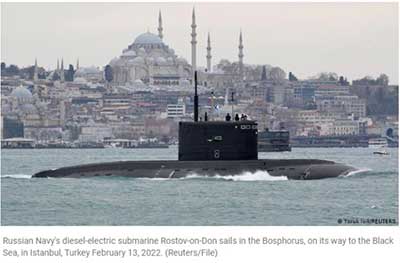Relevance: GS-2: Bilateral, Regional and Global Groupings and Agreements involving India and/or affecting India’s interests. Effect of Policies and Politics of Developed and Developing Countries on India’s interests, Indian Diaspora.
Key Phrases : Bosphorus and Dardanelles straits, Montreux Convention, Demilitarizing, U.N. Convention on the Law of the Sea, Annexation of Crimea, NATO, Ottoman Empire.
Why in News?
- When it comes to international affairs in India, Turkey’s complex relations with Russia don’t often get widespread attention. With Russia’s invasion of Ukraine and the rapid developments in Europe, that is changing, particularly because of Turkey’s geographical location.
- Specifically in focus now are the Bosphorus and Dardanelles straits, under Turkish control, which are strategically important routes because they link the Black Sea with the Mediterranean Sea.
- Turkish leaders labeled Russian’s invasion of Ukraine a war, a rhetorical shift that sets the stage for Turkey limiting Russian warships transiting the Turkish Straits and entering the Black Sea.
Turkey’s stand:
- Now, Turkey has announced its decision to implement the Montreux Convention Regarding the Regime of the Straits, an international convention on naval passage that regulates maritime traffic through the Black Sea that has to pass through these two of its strategic straits.
Montreux Convention
- It regulates maritime traffic through the Black Sea. The 1936 Convention Regarding the Regime of the Straits (commonly referred to as the Montreux Convention, after the city in Switzerland where it was negotiated)
- It guarantees "complete freedom" of passage for all civilian vessels during peacetime but battleships face certain restrictions and permits Turkey to restrict the passage of navies not belonging to Black Sea states.
- It has played an important role in demilitarizing the Black Sea for the past 85+ years.
What about U.N. Convention on the Law of the Sea (UNCLOS)?
- The U.N. Convention on the Law of the Sea (UNCLOS), the “Constitution of the Oceans”, governs transit passage through international straits around the world.
- Article 35 clarifies that UNCLOS does not apply to “long-standing international conventions in force.” The upshot: Montreux Convention’s restrictive provisions, and not UNCLOS, govern the Turkish Straits, which enjoy a truly unique legal status in international transit governance.
- Warships must provide advanced notification to Turkish authorities, which, in turn, must inform the parties to the Convention to allow the passage. Turkey’s intent in implementing this convention is to limit the movement of Russian warships between the Mediterranean Sea and the Black Sea.

Why is this route important to Russia?
Andrew M. Hascher in his paper ‘The Black Sea and the Turkish Straits: Resurgent Strategic Importance in the 21st Century’ writes that “Modern maritime shipping in the Black Sea and Turkish Straits is responsible for a wide variety of goods being brought to the global market.
- The most notable are the energy products of Russia, the South
Caucasus region, and Turkey.
- Oil and natural gas are brought from as far away as the Caspian Sea via pipelines, then transit the Black Sea in both ships and further pipelines.
- This route is directly linked with the Russia’s naval power: Because
Russia’s only warm-water naval ports are on the Black Sea, in order to
effectively project naval power, the Russians must not only exert control of
the sea, but also have unrestricted access to the Dardanelles and
Bosphorus Straits.
- It also provides access to the Mediterranean Sea and the waters beyond.
How are Turkey’s diplomatic relations with Russia & Ukraine?
Turkey has complex diplomatic relations with both Russia and Ukraine, in part due to the region’s socio-political history and geography.
- History of hostile and friendship with Russia: Turkey and Russia,
relations between the Ottoman and the Russian empires were hostile and
resulted in several wars. Post the 1920s, during the Turkish War
of Independence, Bolshevik Russia offered assistance to Turkey.
- Relations deteriorated again during the Second World War, all the way up to the 1950s when Turkey joined NATO. But after the dissolution of the Soviet Union, the bilateral relations have significantly improved and Turkey is one of Russia’s largest trade partners.
- Growing enmity with Russia: Turkey and Russia find themselves on
opposite sides of the debate on several major foreign policy issues, that
are again an extension of their complex histories and wider geopolitical
interests.
- One of the major issues includes the Nagorno-Karabakh conflict, the Syrian Civil War, the Libyan Civil War and the Kosovo conflict. The Armenian genocide is another major bone of contention.
- Turkey backing Ukraine: Turkey established diplomatic relations
with Ukraine in the early 1990s when Ankara became one of the first
countries to recognise Ukraine’s sovereignty. After Russia’s annexation of
Crimea, in 2016, Turkey’s President Erdogan called the annexation an
“occupation” and said that Turkey would not recognise it. Since then, Turkey
has backed Ukraine’s territorial claims.
- Turkey’s rhetoric shifted after Russia’s aggression increased and the government called the invasion of Ukraine “unacceptable”. It called for an immediate halt of Russian attacks and the start of cease-fire negotiations.
Conclusion:
- In many ways, Turkey has found itself caught between Russia and Ukraine, where it not only has friendly ties with both, but also important Black Sea maritime boundaries. “We have political, military and economic relations with Russia. Same with Ukraine. We cannot give this up if you ask me because our country has high interests in this regard,” Erdogan, President of Turkey had said last week
Sources: Indian Express
Mains Question:
Q. With the looming war between Russia-Ukraine, the strategic location of Turkey becomes important. Explain its substantive role in de-escalating Russia-Ukraine tensions. [250 words].









